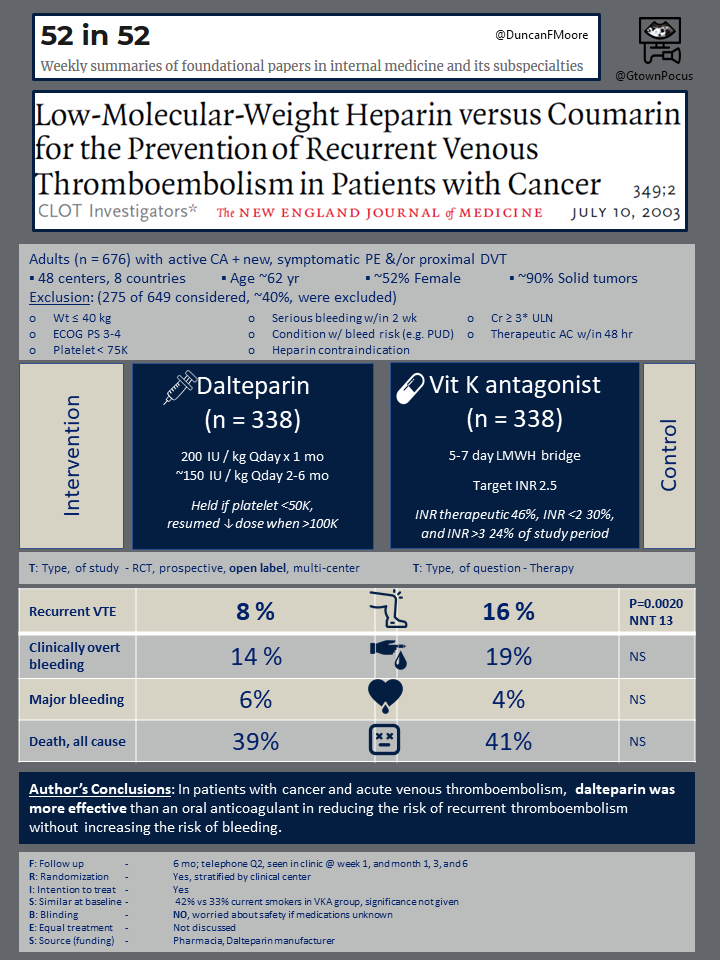CLOT
“Low-Molecular-Weight Heparin versus a Coumarin for the Prevention of Recurrent Venous Thromboembolism in Patients with Cancer”
by the Randomized Comparison of Low-Molecular-Weight Heparin versus Oral Anticoagulant Therapy for the Prevention of Recurrent Venous Thromboembolism in Patients with Cancer (CLOT) Investigators
N Engl J Med. 2003 Jul 10;349(2):146-53. [free full text]
Malignancy is a pro-thrombotic state, and patients with cancer are at significant and sustained risk of venous thromboembolism (VTE) even when treated with warfarin. Warfarin is a suboptimal drug that requires careful monitoring, and its effective administration is challenging in the setting of cancer-associated difficulties with oral intake, end-organ dysfunction, and drug interactions. The 2003 CLOT trial was designed to evaluate whether treatment with low-molecular-weight heparin (LMWH) was superior to treatment with a vitamin K antagonist (VKA) in the prevention of recurrent VTE.
The study randomized adults with active cancer and newly diagnosed symptomatic DVT or PE to treatment with either dalteparin subQ daily (200 IU/kg daily x1 month, then 150 IU/kg daily x5 months) or a vitamin K antagonist x6 months (target INR 2.5, with 5-7 day LMWH bridge). The primary outcome was the recurrence of symptomatic DVT or PE within 6 months of follow-up. Secondary outcomes included major bleed, any bleeding, and all-cause mortality.
Within the six-month follow-up period, symptomatic VTE occurred in 8.0% of the dalteparin group and 15.8% of the VKA group (HR 0.48, 95% CI 0.30-0.77, p=0.002; NNT = 12.9). The Kaplan-Meier estimate of recurrent VTE at 6 months was 9% in the dalteparin group and 17% in the VKA group. 6% of the dalteparin group developed major bleeding versus 6% of the VKA group (p = 0.27). 14% of the dalteparin group sustained any type of bleeding event versus 19% of the VKA group (p = 0.09). Mortality at 6 months was 39% in the dalteparin group versus 41% in the VKA group (p = 0.53).
In summary, treatment of VTE in cancer patients with low-molecular-weight heparin reduced the incidence of recurrent VTE relative to the incidence following treatment with vitamin K antagonists. Notably, this reduction in VTE recurrence was not associated with a change in bleeding risk. However, it also did not correlate with a mortality benefit either. This trial initiated a paradigm shift in the treatment of VTE in cancer. LMWH became the standard of care, although cost and convenience may have limited access and adherence to this treatment.
Until recently, no trial had directly compared a DOAC to LMWH in the prevention of recurrent VTE in malignancy. In an open-label, noninferiority trial, the Hokusai VTE Cancer Investigators demonstrated that the oral Xa inhibitor edoxaban (Savaysa) was noninferior to dalteparin with respect to a composite outcome of recurrent VTE or major bleeding. The 2018 SELECT-D trial compared rivaroxaban (Xarelto) to dalteparin and demonstrated a reduced rate of recurrence among patients treated with rivaroxaban (cumulative 6-month event rate of 4% versus 11%, HR 0.43, 95% CI 0.19–0.99) with no difference in rates of major bleeding but increased “clinically relevant non-major bleeding” within the rivaroxaban group.
Further Reading/References:
1. CLOT @ Wiki Journal Club
2. CLOT @ 2 Minute Medicine
3. UpToDate, “Treatment of venous thromboembolism in patients with malignancy”
4. Hokusai VTE Cancer Trial @ Wiki Journal Club
5. “Edoxaban for the Treatment of Cancer-Associated Venous Thromboembolism,” NEJM 2017
6. “Comparison of an Oral Factor Xa Inhibitor With Low Molecular Weight Heparin in Patients With Cancer With Venous Thromboembolism: Results of a Randomized Trial (SELECT-D).” J Clin Oncol 2018.
Summary by Duncan F. Moore, MD. See the full CLOT post on the medicine52in52.com site

